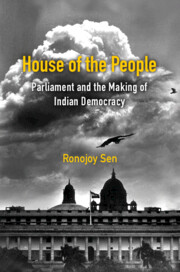Book contents
- Frontmatter
- Dedication
- Contents
- List of Illustrations
- Acknowledgements
- Introduction
- 1 The Road to Parliamentary Democracy: The Constituent Assembly and Its Prehistory
- 2 Protean Institution: The Changing Composition of Parliament
- 3 ‘Please Take Your Seat!’ Disruptions in Parliament
- 4 Inside Out: The Parliamentary Committee System
- 5 Corruption, Criminality and Immunity
- Conclusion
- Index
2 - Protean Institution: The Changing Composition of Parliament
Published online by Cambridge University Press: 11 October 2022
- Frontmatter
- Dedication
- Contents
- List of Illustrations
- Acknowledgements
- Introduction
- 1 The Road to Parliamentary Democracy: The Constituent Assembly and Its Prehistory
- 2 Protean Institution: The Changing Composition of Parliament
- 3 ‘Please Take Your Seat!’ Disruptions in Parliament
- 4 Inside Out: The Parliamentary Committee System
- 5 Corruption, Criminality and Immunity
- Conclusion
- Index
Summary
Parliament is a deliberative assembly of one nation, with one interest, that of the whole – where not local prejudices ought to guide, but the general good, resulting from the general reason of the whole.
– Edmund Burke, ‘Speech to the Electors of Bristol’Vaidyaji was, is and will remain….
– Shrilal Shukla, Raag DarbariWhen it comes to parliament or any representative body, one of the key characteristics is its ‘representativeness’. Representativeness is, however, a sticky concept, as Hannah Pitkin, in her modern classic on representation, and others have argued. Nadia Urbinati has observed that whereas ‘democracy’ is a Greek word which stands for ‘direct rule’, ‘representation’ is a Latin word (with no Greek equivalent) and ‘entails a delegated action on the part of some on the behalf of someone else’.
Several theorists, including Pitkin, have identified Thomas Hobbes’ Leviathan as the ‘first extended and systematic discussion of representation in English’. Later, in the nineteenth century, John Stuart Mill famously wrote that the basis of representative government was not to ‘permit people to govern themselves, but to prevent them from being misgoverned’. Some of the earliest critiques of notions of representation came from Jean-Jacques Rousseau, who, nearly a century after Leviathan was published, declared, ‘The English people believes itself to be free; it is gravely mistaken; it is free only during the elections of Members of Parliament; as soon as the Members are elected, the people are enslaved.’
In contemporary theory, Pitkin's formulation of ‘representation’ as ‘making present in some sense something which is nevertheless not present literally or in fact’ remains popular as well as disputed. After surveying different theories and understandings of representation, Pitkin concluded ‘representing’ means ‘acting in the interests of the represented’.
There have been, however, several reformulations and critiques of Pitkin's treatment of representation. The traditional model of representation is often identified as the ‘deputy’ model where individuals are selected to act as ‘delegates’ of the people. In other words, elected representatives act as the ‘agents’ of the ‘principals’ who elect them. Douglas Chalmers identifies four other models – the partisan model (based on political parties), corporatist model (where groups such as business owners or labour unions are incorporated into decision-making structures), the interest group model (a multiplicity of interest groups shape policy and law) and social-movement model (where groups challenge the status quo).
- Type
- Chapter
- Information
- House of the PeopleParliament and the Making of Indian Democracy, pp. 64 - 127Publisher: Cambridge University PressPrint publication year: 2023

